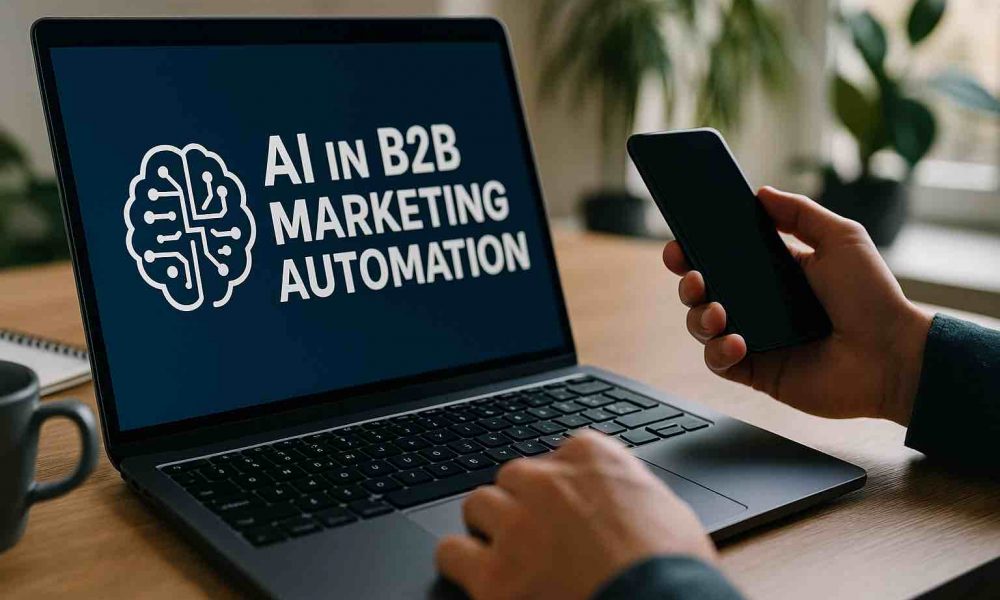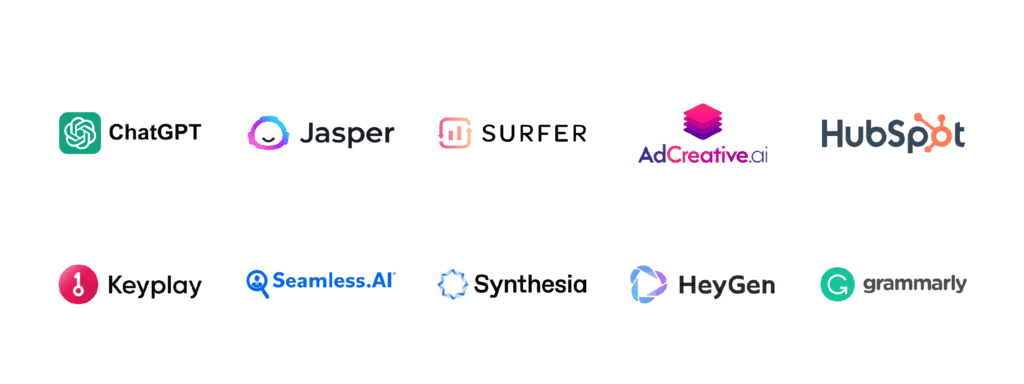The Future of B2B: Taking Advantage Of AI Automation to Drive Success
The landscape of B2B is moving as companies significantly turn to AI automation for strategic benefit. This change promises to boost performance and client engagement with advanced modern technologies. Nevertheless, the integration of these devices is not without its challenges. Recognizing how organizations can navigate this advancing terrain will certainly be vital for future success. What elements will determine the efficiency of AI in this sector? The responses might redefine conventional organization models.
Recognizing AI Automation in B2B
As businesses progressively seek performance, recognizing AI automation in B2B comes to be necessary. AI automation describes making use of expert system technologies to improve and boost organization processes. In the B2B industry, this includes the combination of AI devices to manage tasks such as information evaluation, consumer interactions, and supply chain procedures. By leveraging artificial intelligence and all-natural language processing, companies can enhance accuracy, minimize human mistake, and speed up decision-making (Minarik AI). AI automation assists in the handling of large volumes of data, allowing organizations to extract beneficial insights and enhance their procedures. As companies browse this technical landscape, an extensive grip of AI automation's capacities will empower them to remain responsive and competitive to market demands
Secret Advantages of AI Automation for Services
While several businesses grapple with enhancing operational demands, AI automation provides many advantages that can substantially enhance their efficiency. One significant benefit is effectiveness; AI systems can execute recurring jobs much faster and with better precision than people, consequently minimizing mistakes and releasing up staff members for even more calculated efforts. Furthermore, AI automation enables data-driven decision-making by evaluating large datasets promptly, giving understandings that notify company techniques. Cost decrease is an additional crucial benefit, as automation lessens labor expenses and enhances resource appropriation. AI can enhance scalability, permitting services to adapt to market adjustments quickly. Ultimately, the assimilation of AI automation promotes innovation, making it possible for business to stay competitive in a swiftly progressing landscape.
Transforming Consumer Experiences With AI
AI is reshaping consumer experiences by allowing personalized communications and enhancing engagement. With the implementation of anticipating analytics, services can anticipate consumer demands and choices, causing more customized services. Furthermore, streamlining assistance procedures with AI innovation boosts efficiency and satisfaction, ultimately changing the overall customer trip.
Personalized Interactions and Involvement
Personalized interactions have actually come to be a cornerstone of efficient client engagement in the B2B landscape. By leveraging AI-driven services, organizations can tailor their communication and offerings to satisfy the one-of-a-kind needs of each client. Automated systems examine consumer preferences, behaviors, and data, making it possible for companies to develop customized experiences that resonate with their audience. This degree of personalization not only enhances customer complete satisfaction however additionally cultivates lasting commitment. In addition, AI tools facilitate real-time interactions, allowing businesses to respond promptly and efficiently to inquiries and feedback. As a result, companies can construct more powerful partnerships with customers, making certain that their solutions line up with progressing expectations. Eventually, customized engagement via AI brings about enhanced results and sustained success in the competitive B2B market.
Anticipating Analytics Application
As companies increasingly seek to boost customer experiences, applying anticipating analytics has become a crucial method in the B2B industry. By leveraging data-driven understandings, companies can anticipate consumer needs and choices, enabling them to customize their offerings better. Anticipating analytics utilizes historical information and advanced formulas to anticipate future habits, permitting companies to recognize prospective challenges and possibilities. This positive strategy not only enhances consumer complete satisfaction yet also fosters commitment by supplying prompt and relevant options. In addition, predictive analytics aids in resource appropriation, ensuring that advertising initiatives are focused on high-value prospects. Eventually, the assimilation of predictive analytics gears up B2B business with the devices essential to transform customer interactions and drive long-lasting success in a significantly competitive landscape.
Improving Support Processes
Enhancing client experiences in the B2B market expands past predictive analytics; streamlining support processes plays a necessary duty. By incorporating AI-driven remedies, businesses can enhance and automate routine queries action times, causing increased client fulfillment. Chatbots and online aides supply 24/7 assistance, attending to customer needs quickly and decreasing the concern on human agents. This automation allows groups to concentrate on complicated problems, promoting more meaningful communications. In addition, AI devices can examine support data to recognize patterns and areas for improvement, ensuring continual improvement of service quality. As organizations take on these innovations, they place themselves as customer-centric and responsive, inevitably driving loyalty and business development in a progressively competitive landscape.
Enhancing Workflow and Processes
Streamlining operations and procedures in B2B atmospheres is important for boosting general efficiency. By enhancing workflow effectiveness and automating routine jobs, organizations can decrease manual errors and free up useful resources. This change not only enhances productivity however additionally allows groups to focus on calculated initiatives that drive growth.
Maximizing Workflow Performance
Optimizing process performance is vital for services looking for to decrease functional prices and improve efficiency. By analyzing existing processes, organizations can determine traffic jams and redundancies that prevent performance. Executing structured treatments enhances communication and partnership amongst groups, making sure that tasks are completed much more quickly. Making use of data-driven understandings enables companies to make educated choices that improve procedures additionally. In addition, adopting integrated technologies can help with seamless info circulation, lessening the threat of mistakes and hold-ups. As services welcome these adjustments, they not just promote a much more active job setting yet additionally place themselves to react swiftly to market needs - Growth Systems For B2B. Eventually, focusing on process effectiveness allows organizations to assign sources properly, driving lasting success in a significantly affordable landscape
Automating Routine Tasks
Many companies are significantly transforming to automation to manage regular tasks, recognizing its potential to substantially boost operational performance. By releasing AI-driven options, business can streamline repetitive activities such as information entrance, invoice handling, and client inquiries. This change not just decreases human error yet also frees up beneficial staff member time, permitting personnel to focus on strategic campaigns and value-added tasks. In addition, automation can boost action times and service uniformity, resulting in enhanced client complete satisfaction. As businesses browse a competitive landscape, leveraging automation for routine jobs ends up being important for preserving and maximizing process dexterity. Eventually, this strategy promotes advancement and drives development, positioning companies for long-term success in the progressing B2B environment.
Enhancing Decision-Making With Information Insights

Overcoming Challenges in AI Implementation
Although AI application holds the pledge of considerable functional enhancements, organizations frequently deal with a myriad of obstacles that can prevent progress. Trick obstacles include data quality problems, as lots of business battle with insufficient or irregular datasets needed for efficient AI training. Furthermore, resistance to alter within the labor force can hamper the fostering of AI innovations, as staff members may fear job displacement or do not have the needed abilities. Budget plan restrictions likewise provide a challenge, limiting investment in the called for framework and ability. Additionally, incorporating AI systems with existing processes can be complex, requiring significant time and sources. Getting rid of these difficulties necessitates a strategic strategy that consists of detailed training, adjustment administration, and a commitment to continual enhancement in AI initiatives.
Future Trends: The Following Frontier in B2B Automation
While the landscape of B2B automation continues to evolve, arising patterns are poised to redefine exactly how organizations run. The combination of advanced expert system will promote a lot more customized consumer experiences, enabling businesses go to this web-site to customize services exactly to client requirements. The rise of anticipating analytics will certainly enable companies to anticipate market shifts and maximize decision-making processes. Automation of regular tasks with robot process automation (RPA) will certainly boost effectiveness, lowering operational costs significantly. Additionally, the adoption of blockchain modern technology promises enhanced openness and safety and security in purchases. As these innovations gain traction, firms will increasingly leverage AI-driven understandings to promote cooperation, improve supply chains, and improve total productivity, marking a transformative shift in the B2B landscape.
Regularly Asked Inquiries
What Kinds Of Companies Can Profit The Majority Of From AI Automation?
Manufacturing, logistics, and customer solution businesses can benefit most from AI automation. These markets boost functional performance, reduce costs, and enhance client communications, inevitably bring about increased productivity and profitability in an open market.
Exactly How Can Little Services Carry Out AI Automation Properly?
Small companies can implement AI automation effectively by identifying repetitive tasks, choosing user-friendly tools, making sure appropriate training for workers, and slowly integrating services to enhance workflows while keeping track of performance and adjusting strategies based upon responses.
What Prevail False Impressions Regarding AI in B2B?
Common misunderstandings regarding AI in B2B include the belief that it is just for big business, that it ensures instantaneous outcomes, which it can completely change human decision-making instead of increasing it. AI Automation For B2B.
How Does AI Automation Influence Worker Duties and Job Protection?
AI automation improves employee duties by enhancing repetitive jobs, promoting performance and technology. While some concern job loss, it often develops opportunities for upskilling and brand-new settings, ultimately improving job protection with included worth and efficiency.
What Skills Are Required to Manage AI Automation Projects?

As companies progressively seek efficiency, comprehending AI automation in B2B comes to be vital. AI automation facilitates the handling of big quantities of data, allowing organizations to extract useful understandings and optimize their procedures. While several companies grapple with boosting functional demands, AI automation provides many advantages that can significantly boost their performance. Automation of routine tasks with robot procedure automation (RPA) will certainly enhance efficiency, minimizing functional prices considerably. Manufacturing, logistics, and client solution organizations can profit most from AI automation.